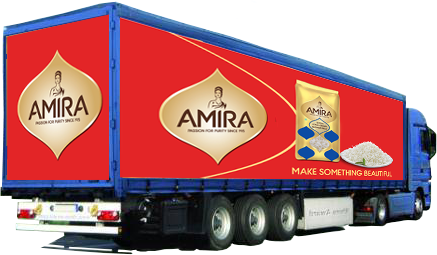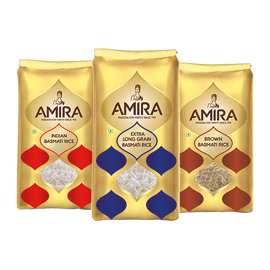
Source: Amira Nature Foods
Given the increased power of big retailers and changing consumer preferences, most consumer packaged food companies are finding it challenging to grow their revenues and maintain profitability. Amira Nature Foods (NYSE: ANFI), a leading packaged Indian specialty rice company, is a notable outlier. It has grown its revenues and EBITDA by impressive four-year CAGRs of 27% and 34%, respectively. What are the reasons behind Amira Nature Foods' strong growth? It's worth examining other companies like Mattress Firm Holding (NASDAQ: MFRM) and WhiteWave Foods (WWAV) to gain a better understanding of Amira's strategies.
While Amira's financial numbers have been impressive, it has recently been accused of 'mistatements in SEC filings' by Arihaan Capital. To add fuel to the fire, a recent change of auditors for Amira announced in April has also contributed to a three-month share price decline of 43%. How should investors react?

Source: Amira Nature Foods
Wide product range acts as defensive firewall
Amira focuses on Indian specialty rice, primarily Basmati Rice. Basmati Rice is an allergy-free specialty product only grown in the Indian subcontinent that boasts characteristics such as unique aroma and slender & extra long grains. Although the superior quality of Basmati Rice allows Amira to charge premium prices, Amira doesn't give competitors the opportunity to steal market share by penetrating the market with lower-priced versions.
Amira sells a complete range of specialty rice products catering to all the different consumer segments, all the way from the 'best money you can buy' gourmet rice to the 'value-for-money' mainstream rice products. This ensures that Amira can cross-sell lower-priced versions of its rice products to its premium product customers if they choose to trade down due to difficult economic conditions.
On the other hand, Amira is also well-positioned to up-sell premium versions of its rice products, as its customers become more affluent. This is supported by market research which forecasts that the Indian middle class population will grow at a 13% CAGR between 2005 and 2025.
While it may seem far-fetched to compare a food company with a bedding products distributor, Mattress Firm offers valuable insights into the importance of having a diverse, multi price-tiered product range serving varied customer segments. Its product assortment runs the gamut of price points from promotional mattresses selling below $500 to ultra-luxury ones shooting above $2,000. Both ends of the product spectrum serve different purposes for Mattress Firm.
While the high-margin luxury bedding products account for less than 10% of Mattress Firm's revenues, they are a significant contributor to profitability. On the other hand, the high-volume, low margin mass products help Mattress Firm to retain customer share and ward off new entrants.
Similar to Amira, Mattress Firm's product strategies have been validated by its outstanding financial performance. It expanded its sales and EBITDA by five-year CAGRs of 30% and 32% respectively from 2009 to 2013.
Leveraging on emerging food trends
Seeing the rising demand for organic food products, Amira launched its organic food division in 2013, with the launch of organic ready meals at the Anuga Food & Beverage show in October last year. Since then, Amira has introduced new varieties of its organic & natural ready-to-heat product lines such as Basmati Rice with Kidney Beans, Walnut Brown Rice and Red and Brown Rice Medley. More significantly, Amira also worked closely with more than 3,000 farmers to instill in them its "Passion for Purity" approach toward organic food.
In addition, Amira also expanded into adjacent market such as ready-to-eat snacks. Based on its internal studies, Amira values the Indian snack market at $3billion and expects it grow at a yearly rate of 20%. Similar to ready-to-heat meals, ready-to-eat snacks are gaining resonance with consumers as the pace of their lives hastens.
WhiteWave is another high-growth food company which has capitalized on the latest food trends to its advantage. Based on its internal estimates, it has been the fastest growing publicly traded food & beverage company for the past one, two and four year periods. This doesn't come as a surprise, as WhiteWave's products are the leading brands in the product categories with the most consumer interest.
One example is the U.S organic fluid-dairy-milk market, where WhiteWave's premium dairy brand Horizon Organic is the top seller. As more consumers prefer low-fat, organic versions of milk to meet their daily calcium intake. WhiteWave will be a key beneficiary.
Another area of significant consumer demand is organic produce. In January , WhiteWave completed the acquisition of Earthbound Farm, the market leader in the U.S. organic produce (non-dairy) market. WhiteWave's market leadership in trending food-product categories will allow it to capitalize on the underlying market growth.
Red flags
In an article written this month, Arihaan Capital sees more than 50% downside for Amira on the basis of five factors: auditor resignation; misstatement in SEC filings; undisclosed related party potentially used to inflate margins; discrepancies in financials disclosed to SEC and Ministry of Corporate Affairs in India; and inflated revenue contribution from basmati rice exports.
Given that it's difficult to detect earnings manipulation or even fraud from an outsider's perspective relying solely on public filings, it's impossible to pass any judgment on Amira. However, as a cautious investor, I will steer clear of the stock pending further management response.
Foolish final thoughts
While I am impressed with Amira's product strategies and its strong financial numbers, recent allegations by Arihaan Capital and the high proportion of short-sellers create uncertainty. I would advise investors to wait for management's response at the upcoming full year fiscal 2014 results release before committing to any position in the stock.




